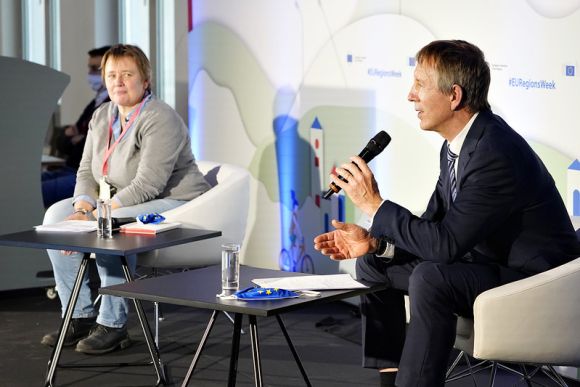
On October 14th a workshop called “Before and after the coronavirus - solidarity in action with 30 years of Interreg” took place at the EU Regions Week.
Interreg is a long-standing programme of the European Union which aims to support cooperation across borders at a national and regional level. Although many national borders were closed as a response to coronavirus, neighboring connections are vital for day-to-day life within the European Union.
In an interactive workshop with videos and opportunities for the audience to ask questions, attendees gained an understanding of the importance of Interreg and the challenges that Covid-19 are bringing to the programme.
For Jean-Pierre Halkin, the Head of the Unit for Macro-regions, there is a key word to describe the Interreg programme: cooperation.
“In a year that the borders were closed, we could see the hospitality from the people and spirit of solidarity between the member states. Countries showed their hospitality with regard to the most affected regions and neighboring countries with the most difficulties, through medical care”, says Jean-Pierre.
On the other hand, Nathalie Verschelde, the Deputy Head of Unit for Interreg, describes the Interreg as a mature instrument. For her, border regions have been able to take advantage of various investments in order to specialize in certain sectors and to be able to cooperate and get the best out of each investment. In a year that our economies have been deeply affected, border closures caused many problems for our regions, and we need this investment more than ever.
“In the Europe of the past, people thought that there was no need to invest in borders and we didn’t need to be so connected, but the truth is that generation after generation we continue to believe and have confidence in cooperation between border regions, so that we can further develop these regions”, asserted Nathalie.
The two speakers of the workshop already have their eyes on the future. Promoting communication, integrating young people and combatting climate change are some of the issues that will be addressed.
“We will continue to invest in promoting the programme and the benefits of cooperation between the borders of different countries, in order to attract the interest of countries. For example, we want to show that if a country can invest and specialize in specific medical patents and the neighboring region specializes in other specific patents, this will promote the spirit of teamwork and increase circulation and social life between regions”, explains Jean-Pierre.
“We will continue to work to combat the problems arising from climate change. The consequences are increasing and that is why we want to continue to invest in cooperation, such as, for example, the cooperation between Portugal and Spain that manages to speed up the circulation of firefighters and special forces in fighting fires and other natural disasters”, says Nathalie.
Even with the celebrations prepared and impossible to be held because of the pandemic, Nathalia guarantees that it was possible to readapt the celebrations of the 30 years of the Interreg programme very quickly.
The programme is to be congratulated! In a year that Interreg celebrated its thirtieth birthday, the borders were closed and the programme had to deal with this problem. During these months the programme did everything to facilitate circulation in case of emergency and the need for basic goods, such as the circulation of emergency ambulances to the nearest hospitals and the transport of food to border regions.
Nathalie and Jean-Pierre are proud of what the programme has achieved this year. It is hoped that in a while there may be the possibility of having the long-awaited and well-deserved party of the 30 years of the programme.
By Francisco Sezinando, Portugal



